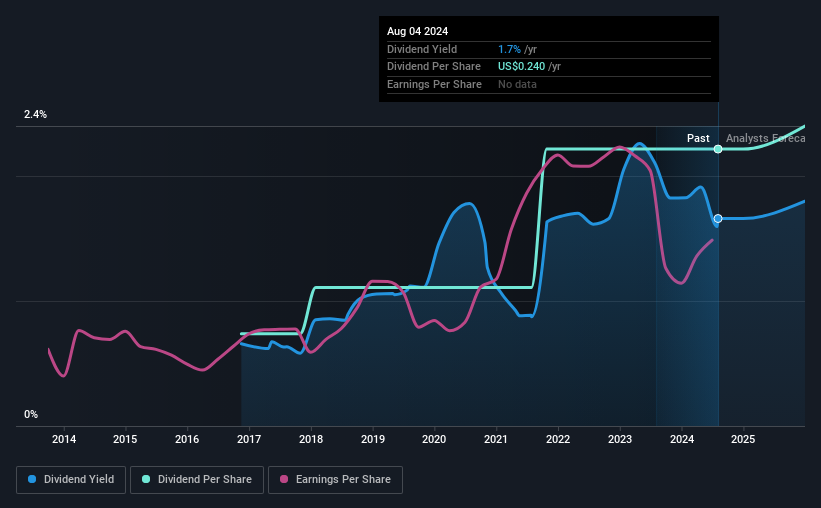- United States
- /
- Banks
- /
- NasdaqGM:FRBA
Be Sure To Check Out First Bank (NASDAQ:FRBA) Before It Goes Ex-Dividend

Some investors rely on dividends for growing their wealth, and if you're one of those dividend sleuths, you might be intrigued to know that First Bank (NASDAQ:FRBA) is about to go ex-dividend in just 4 days. The ex-dividend date is usually set to be one business day before the record date which is the cut-off date on which you must be present on the company's books as a shareholder in order to receive the dividend. The ex-dividend date is important as the process of settlement involves two full business days. So if you miss that date, you would not show up on the company's books on the record date. Therefore, if you purchase First Bank's shares on or after the 9th of August, you won't be eligible to receive the dividend, when it is paid on the 23rd of August.
The company's upcoming dividend is US$0.06 a share, following on from the last 12 months, when the company distributed a total of US$0.24 per share to shareholders. Based on the last year's worth of payments, First Bank stock has a trailing yield of around 1.7% on the current share price of US$14.46. If you buy this business for its dividend, you should have an idea of whether First Bank's dividend is reliable and sustainable. We need to see whether the dividend is covered by earnings and if it's growing.
View our latest analysis for First Bank
If a company pays out more in dividends than it earned, then the dividend might become unsustainable - hardly an ideal situation. First Bank paid out just 19% of its profit last year, which we think is conservatively low and leaves plenty of margin for unexpected circumstances.
Companies that pay out less in dividends than they earn in profits generally have more sustainable dividends. The lower the payout ratio, the more wiggle room the business has before it could be forced to cut the dividend.
Click here to see the company's payout ratio, plus analyst estimates of its future dividends.

Have Earnings And Dividends Been Growing?
Businesses with strong growth prospects usually make the best dividend payers, because it's easier to grow dividends when earnings per share are improving. If business enters a downturn and the dividend is cut, the company could see its value fall precipitously. This is why it's a relief to see First Bank earnings per share are up 4.8% per annum over the last five years.
The main way most investors will assess a company's dividend prospects is by checking the historical rate of dividend growth. In the past eight years, First Bank has increased its dividend at approximately 15% a year on average. We're glad to see dividends rising alongside earnings over a number of years, which may be a sign the company intends to share the growth with shareholders.
The Bottom Line
Has First Bank got what it takes to maintain its dividend payments? It has been growing its earnings per share somewhat in recent years, although it reinvests more than half its earnings in the business, which could suggest there are some growth projects that have not yet reached fruition. In summary, First Bank appears to have some promise as a dividend stock, and we'd suggest taking a closer look at it.
In light of that, while First Bank has an appealing dividend, it's worth knowing the risks involved with this stock. For example - First Bank has 2 warning signs we think you should be aware of.
A common investing mistake is buying the first interesting stock you see. Here you can find a full list of high-yield dividend stocks.
New: AI Stock Screener & Alerts
Our new AI Stock Screener scans the market every day to uncover opportunities.
• Dividend Powerhouses (3%+ Yield)
• Undervalued Small Caps with Insider Buying
• High growth Tech and AI Companies
Or build your own from over 50 metrics.
Have feedback on this article? Concerned about the content? Get in touch with us directly. Alternatively, email editorial-team (at) simplywallst.com.
This article by Simply Wall St is general in nature. We provide commentary based on historical data and analyst forecasts only using an unbiased methodology and our articles are not intended to be financial advice. It does not constitute a recommendation to buy or sell any stock, and does not take account of your objectives, or your financial situation. We aim to bring you long-term focused analysis driven by fundamental data. Note that our analysis may not factor in the latest price-sensitive company announcements or qualitative material. Simply Wall St has no position in any stocks mentioned.
Have feedback on this article? Concerned about the content? Get in touch with us directly. Alternatively, email editorial-team@simplywallst.com
About NasdaqGM:FRBA
First Bank
Provides various banking products and services to small to mid-sized businesses and individuals.
Flawless balance sheet and fair value.

